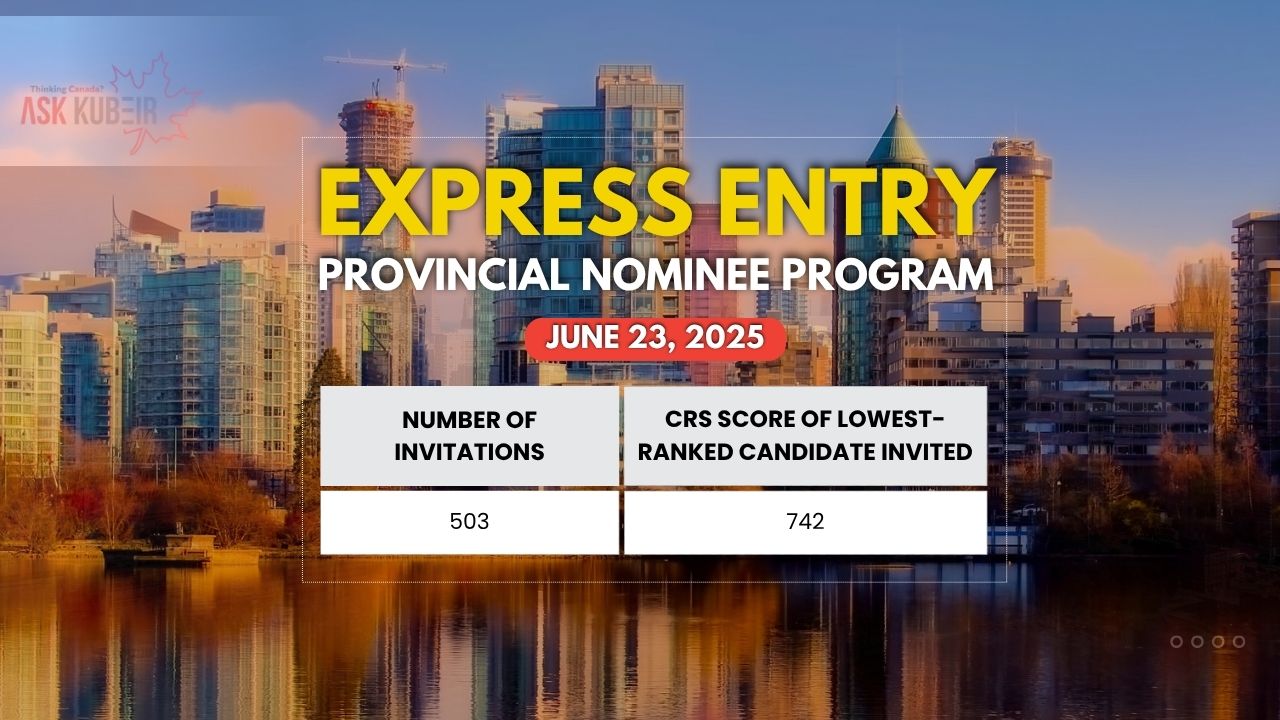
Related Post






Proof of Funds – Canada Express Entry
Proof of funds is a significant factor influencing your PR application under Express Entry. Let’s discusstoday what it is all about, what can be shown and what may not be accepted……
Proof of Funds – Settlement Funds
#proofOFfunds
Legal and Technical
Canadian Immigration Law – IRPA under subsection R76(1)(b)(i) states that
(b) the skilled worker must
(i) have in the form of transferable and available funds, unencumbered by debts or other obligations, an amount equal to one half of the minimum necessary income applicable in respect of the group of persons consisting of the skilled worker and their family members, or
According to section R77, the requirement and criteria for settlement funds must be met when the application is made and when the permanent resident visa is issued.
ICCRC states::: (ICCRC link – check under the proof of funds)
“For proof, you must get official letters from any banks or financial institutions where you are holding your money.
Letter(s) must:
• be printed on the financial institution’s letterhead
• include their contact information (address, telephone number and, email address)
• include your name
• list outstanding debts such as credit card debts and loans
• include, for each current bank and investment account:
o account numbers
o the date each account was opened
o the current balance of each account
o the average balance for the past six months “””
• The applicants will need to prove they have enough money when they apply to immigrate and again when the application is approved.
Proof of funds/Settlement funds are required only by applicants under FSW/FSTW categories. Applicants being processed under CEC or those who have a valid job offer need not show any proof of funds to process their application for PR.
What we understand
As part of the permanent resident application process, you will need to prove to the Canadian government that you have enough monetary funds to support yourself and any accompanying family members when you arrive in Canada. This is because the government will not provide any financial support for new immigrants. Therefore they need to be sure that you arrive with enough money to establish yourself in Canada.
Even if your family is mentioned as non-accompanying, you still have to show funds equal to your family size.
ICCRC sets guidelines for the required funds they consider you need as a minimum to establish yourself in Canada. The amount required depends on the size of your family. These amounts can vary from time to time, so you should check these figures when finalizing your application.
At the time of your application, you must show that you have at least the required amount for your application to be processed. The funds must be unencumbered, free of liens, and not be borrowed. The money must be readily available in the transferable currency for settlement in Canada.
Obviously, you can carry any amount of funds when you arrive in Canada. You only need to declare if you are carrying $10,000 or more per the prevalent border and customs regulations. You are also required to show #POF at the time of landing if asked for by the border officer. This may be in the form of cash, bankers’ checks, drafts, updated bank statements from the home country account, or a combination of these.
You must provide evidence of the availability of these funds through bank account details that show the required amount aging (recommended/preferred) over a period of 6 months consecutively or progressively. Most PNP requires the fund statements for 3-6 months.
In case your funds are not aged, you must be able to show a transaction and evidence of an acceptable source of those funds, keeping in mind that they are not borrowed for this purpose. Your funds must be free of any liens at all times.
As per ICCRC, you are also required to show the list of liabilities from the bank, including loans, credit card debts, or similar.
In such cases, any loans against assets do not impact the ICCRC requirement of POF. Hence house loans, car loans, etc. do not have any negative impact.
Regarding consumer loans/debt like personal loans/credit cards, it is ideal (not mandatory) to have the amount of debt covered when providing POF. This means that if such debt is $1000 and your POF requirement is $12300, then the ideal available balance would be $13300 or more. However, unless this loan amount is big and covers a large portion of the POF, it “may” be disregarded by ICCRC when considering POF. Indeed ICCRC takes a comprehensive approach to previous debts and liabilities. It is best to address this in your LOE, explaining how you plan to settle your liabilities without affecting your #POF.
When showing proof of funds in a currency other than CAD$, it is imperative that you maintain funds that cover the foreign exchange fluctuations. You can use Bank of Canada exchange rate trends to see the recent highest point and maintain your funds equal to or more than an amount that won’t be affected by the exchange rate fluctuations. It is important that the amount shown in your account is equal to or more than the applicable amount for your POF on the day CIC will verify your documents. They will use Bank of Canada exchange rate monitor to convert and check the equivalency of your funds that are held in your local currency.
Amount of funds required as of 15th July 2021 (always check the link here for updated funds requirement)
| Number of Family Members | Funds Required (in Canadian dollars) 2021 |
|---|---|
| 1 | $13,213 |
| 2 | $16,449 |
| 3 | $20,222 |
| 4 | $24,553 |
| 5 | $27,847 |
| 6 | $31,407 |
| 7 | $34,967 |
| For each additional family member | $3,560 |
You may be wondering what type of funds you can use and what type of proof is required. Well, there are several things to consider:
Savings/current/salary A/C: If you have savings that match or exceed the required amount, you can supply a copy of your bank statement for the past six months showing the funds in your account. You should be able to show the funds in your account for a minimum of 3-4 months and if the funds have recently been transferred, you will need to show where they came from.
It must be obvious that you are not just sending a statement just after being paid and that all the funds will disappear from the account the following week. If your money is split between several accounts, you will need to provide details of each up to the amount required.
Shares, Bonds etc.: This type of investment is not acceptable for CIC purposes as these are volatile accounts and cannot be accepted at face value. If you want to use this type of funding, you will need to liquidate them in a suitable bank account and send the statements as above.
Possessions: Again, this is not acceptable by CIC. You will need to liquidate the assets and deposit the money in a suitable account. This applies to vehicles, antiques, value items, jewelry, gold bullion etc.
Real Estate: Property money is probably the most invested globally. Many people plan to sell property owned in their home country before landing in Canada and use the equity to establish themselves. Therefore, Real Estate can not be used as POF, but you may liquidate it and show the sale deed as evidence of deposit and offer bank details as mentioned above.
BitCoins/ Cryptocurrency: Due to the lack of clear legislation on this mode of funds, they are not accepted as POF. They are also known to be speculative in nature. If you hold these funds, it is best to encash them in your account and show the transaction receipt. You can further explain it in LOE.
Showing funds held in joint accounts and spouse’s accounts
If an applicant’s spouse accompanies, the applicant can show the funds held together in a joint account to meet the PoF requirement. However, to show the funds for meeting the PoF requirement, held in an account under the spouse’s name only, the applicant must prove that they have access to the funds. This can be done by the dependent spouse stating in writing that the funds are freely accessible by the primary spouse to be used as they see fit and are free of any obligations.
Similarly, if an applicant has a joint account with their parent, they will have to execute an affidavit affirming that the applicant can use the funds held in the joint account to meet the PoF requirements.
Using gift deed to meet PoF requirement
If you are invited to apply and cannot meet the PoF requirements, you can consider meeting this by getting the funds in the form of a gift. A gift, as defined under the law, is the “voluntary transfer of property (movable or immovable) from one person (the donor or grantor) to another (the donee or grantee) without full valuable consideration (exchange of money or property) or an expectation of return. When executing the gift deed (notarized affidavit), it should meet the formalities of the country in which the gift deed is being executed. The gift deed will also overcome the six-month average balance requirement as the funds will be shown as a gift to the applicant. This is acceptable as the source of funds does not meet the aging requirement.
Please note that some PNPs like SINP (Saskatchewan) does not accept gift deeds for funds if the funds have not been maintained in the account for atleast 03months. They are quite strict about this.
What cannot be used as PoF?
Any asset that cannot be readily liquidated and the price cannot be ascertained immediately cannot be used to meet the PoF requirements. Therefore, real estate assets, stocks etc. cannot be used.
However, bank deposits, treasury bills, bonds, provident funds (India), Life Insurance Policy (only unconditional surrender value can be used. whole life insurance, term life cannot be used), and similar monetary investments can be readily liquidated, can be used for PoF, without liquidating them.
So, as a rule of thumb, any funds that can be liquidated on-demand and at face value may be accepted as proof of funds.
If you meet the majority of your PoF over the required age and make small deposits nearer to your application to meet the fund requirement, then you may not have to prove the source of such deposits. The proportion of the deposits should not be more than 10-20% if you do not wish to show their source.
It’s also a good idea to clearly mention the details of your PoF if they are not in the required format as per ICCRC. Please don’t leave it to their automatic understanding.
N.B. You do not have to show that you have these funds if you have arranged employment in Canada and apply under CEC.
Age of Funds Requirement
Federal
ICCRC asks for an official letter from the bank that states the account details, liabilities, and average monthly balance for the last six months.
This does not mean that CIC wants to see the funds six months old. Nowhere in the immigration law does it specify that the funds must have been maintained for a period of 6 months or more.
This requirement is to check if there are any recent large deposits in your account contributing to the proof of funds requirement; then these must NOT be borrowed or a loan. These funds MUST be unencumbered and free from any liens.
Progressive build-up of funds over the last few months through savings, deposits and sale of assets is all acceptable and fine.
So if you have any large deposits contributing to your proof of funds, then be prepared to show a source of these funds and explain this in your LOE.
Provinces
Under PNP (like SINP), some provinces insist that the funds have been strictly maintained for at least three months before the application. If the funds are newer in age, an adequate source of funds must be provided, but the province may not accept this. Hence always refer to the updated province application guide for settlement funds requirements.
Though, Some PNPs will accept the following under their POF (however, the same may not apply to ICCRC under EE)
Personal chequing or savings accounts
Bonds
Cash-value life insurance
Guaranteed Investment Certificates (GICs) or Certificates of Deposit
Mutual Funds
Provident Funds (an official letter from the provident fund organization indicating the number of funds that are accessible is required)
Registered Retirement Savings Plans (RRSPs)
Stocks (only for PNPs. May not be accepted by ICCRC during federal application processing)
Tax-Free Savings Accounts (TFSAs)
Term deposits and time deposits (must be valid at the time of application and remain valid throughout the entire application process)
Treasury Bills
Debentures, credit cards, lines of credit, gold, cash, property or businesses are not accepted as settlement funds.
Provident Funds (PF) or any similar retirement funds: It is largely accepted by PNPs and CIC. However, it has not been mentioned by CIC. A recent email to ICCRC New Delhi confirmed that they would accept it as POF. Since, in most cases, POF will be checked at LVO and they are aware of the local country-specific funds and requirements, I would safely say that PF or similar retirement funds will be accepted. It will continue to be at the discretion of the VO.
Mutual Funds: Mutual funds are subject to market risks and conditions and cannot be liquidated at face value and demand. Therefore there is a large grey area in its acceptance as POF. Some applicants have managed to produce their MF statements from the holding institution and have succeeded in getting their PPR, but in most cases, the amount they were able to show was far greater than the actual amount required on their application.
I know of a few applicants who got procedural fairness asking for clarity on Mutual Funds and further showing why these funds should be considered safe instruments. They had to liquidate their funds and show their liquid funds as POF in those cases.
Life Insurance Policy – If you can provide a certificate from the institution holding your funds stating the surrender value of the policy, which can be encashed on demand, then that amount may be used as #POF
Proof of Funds at the time of first landing
While #POF is not commonly asked for at the time of landing, it’s best to have it available with you if the Border Officer chooses to ask for it. Most people are not asked for proof of funds or it’s just a fleeting question – “How much money are you carrying with you today?”
You must be prepared to show #POF if and when asked by the border officer at the time of examination of your CoPR during your first landing.
In response to a recent query sent to the New Delhi Visa Office with regards to Proof of Funds at the time of landing, they replied:
Acceptable proof of funds are:
-bank accounts in your name or the name of your accompanying spouse/common-law partner;
-cashable investments in your name or the name of your accompanying spouse/common-law partner;
-cashable fixed deposits in your name of the name of your accompanying spouse/common-law partner.
Not acceptable are:
-bank accounts in someone else’s name;
-bank accounts that are joint in your name and someone else (other than your accompanying spouse/common-law partner);
-bank accounts in the name of your spouse who is not accompanying you to Canada ;
-property valuations;
-vehicle valuations;
-jewelry valuations.
You are not required to carry your funds in cash when you arrive in Canada. You are, however, required to show documentary evidence that you have the funds available (in bank accounts or cashable investments) and that they can be transferred to Canada.
A port of entry officer in Canada may seek to confirm these funds before granting you permanent residence along with your dependents.
As per this CIC link, you may bring any money to Canada as you wish; there is no limit. However, if you are carrying cash or other financial instruments equal to or greater than $10,000, you must declare it to the border officer.
The link for CBSA regarding this information is here
#foreverhopeful
